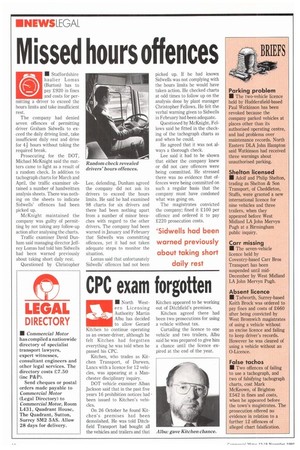Missed hours offences
Page 16

If you've noticed an error in this article please click here to report it so we can fix it.
• Staffordshire haulier Lomas (Burton) has to pay £920 in fines and costs for permitting a driver to exceed the hours limits and take insufficient rest.
The company had denied seven offences of permitting driver Graham Sidwells to exceed the daily driving limit, take insufficient daily rest and drive for 4i hours without taking the required break.
Prosecuting for the DOT, Michael McKnight said the matters came to light as a result of a random check. In addition to tachograph charts for March and April, the traffic examiner obtained a number of handwritten analysis sheets. There was nothing on the sheets to indicate Sidwells' offences had been picked up.
McKnight maintained the company was guilty of permitting by not taking any follow-up action after analysing the charts.
Traffic examiner David Dunham said managing director Jeffrey Lomas had told him Sidwells had been warned previously about taking short daily rest.
Questioned by Christopher Lee, defending, Dunham agreed the company did not ask its drivers to exceed the hours limits. He said he had examined 98 charts for six drivers and there had been nothing apart from a number of minor breaches with regard to the other drivers. The company had been warned in January and February that Sidwells was committing offences, yet it had not taken adequate steps to monitor the situation.
Lomas said that unfortunately Sidwells' offences had not been picked up. If he had known Sidwells was not complying with the hours limits he would have taken action. He checked charts at odd times to follow up on the analysis done by plant manager Christopher Fellows. He felt the verbal warning given to Sidwells in February had been adequate.
Questioned by McKnight, Fellows said he fitted in the checking of the tachograph charts as and when be could.
He agreed that it was not always a thorough check.
Lee said it had to be shown that either the company knew or did not care offences were being committed. He stressed there was no evidence that offences were being committed on such a regular basis that the company must have condoned what was going on.
The magistrates convicted the company; fined it £100 per offence and ordered it to pay £220 prosecution costs.
`Sidwells had been warned previously about taking short daily rest












































































